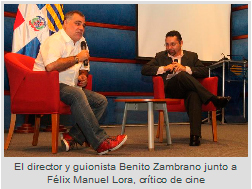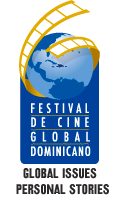
(Santo Domingo, 14 August, 2012) - For Benito Zambrano, “the filmmaker has a responsibility to work for a better society.” Film should be a product of cultural art that moves people to reflections that go beyond simple entertainment, he feels.
Director and writer of Solas, spoke about the making socially relevant films at a roundtable, organized by the Global Media Arts Institute (GMAI), part of the
Fundación Global Democracia y Desarrollo (FUNGLODE).
Félix Manuel Lora, film critic, conducted the discussion with Mr. Zambrano, Spanish director and writer, at the workshop that brought together Dominican producers, directors and actors at the FUNGLODE auditorium. Following the workshop, the fifteen participants were awarded certificates. The workshop was called, “The Actor and Writer/Director Working Together.”
producers, directors and actors at the FUNGLODE auditorium. Following the workshop, the fifteen participants were awarded certificates. The workshop was called, “The Actor and Writer/Director Working Together.”
“Culture is a weapon”, not an innocent weapon but not iniquitous either, said the director and writer of La voz dormida, (The Sleeping Voice) nominated for an Oscar for Best Picture.
Zambrano said he does not tolerate revisionism, incorrectly told stories nor films that seek only to make money and have no cultural or social value. In the United States, people have realized that film is s good business and “many of us have fallen into this trap,” he said, including himself. “We all want to make films that will earn money.”
He called on people to be alert and clear about the fact that not all cinema is cultural art and that filmmakers should be aware of this.
In that he understands that culture is not on the margins of politics or education, he sees in film an opportunity to be involved in issues that should be dealt with carefully and can be directly related to society’s demands and needs.
“We have to be aware how we can and should influence society,” he said while insisting that filmmakers should commit to rise to this creative challenge.
Zambrano used part of his lecture to stress the relevance of the script and the cast in making a good movie. In his opinion, a badly written script cannot get good acting out of the cast.
His recommendation was to take care of the actor “because it is emotions that speak to them and tell them the story,” he told the participants of the workshop who listened to him with obvious interest and pleasure.
At the end of the workshop, Zambrano and Omar de la Cruz, Director of the GMAI and the Dominican Global Film Festival, handed out certificates to the participants.
The workshop included improvisation among actors, the production and directing of a sequence written by the scriptwriter. He also touched on ideas on making excellent films with modest budgets.
Zambrano’s visit was organized in coordination with the cultural section of the Spanish Embassy in the Dominican Republic and support from the General Directorate of Film (DGCINE) and the Audiovisual Studies Center (CENECA), part of CERTV.
Benito Zambrano, born in southern Spain, studied dramatic arts for 3 years with the intention of becoming a theater director. He worked for Spanish TV as a photographer and camera operator. He took his early steps in film when he studied at the International Film and TV School in San Antonio de los Baños, Cuba where he directed his short film, El encanto de la luna llena (1995). His movie, Solas won five Goyas for Best New Director, Best Female Actress, Best Supporting Actress, Best Supporting Actor and Best Original Screenplay.









